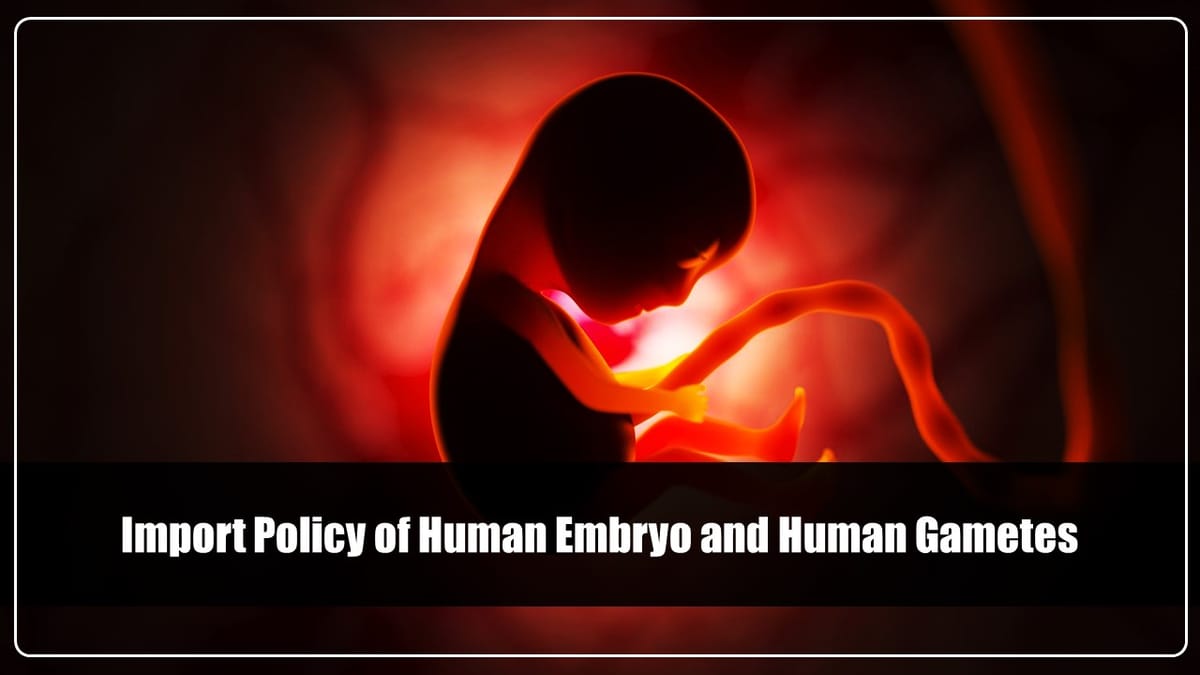Government Prohibits Imports of Human Gametes in India: A Bold Step Towards Ethical Reproductive Practices
Government through a notification recently prohibited import of human gametes in India, marking a bold step towards ensuring ethical and responsible reproductive practises.

Government Prohibits Imports of Human Gametes in India: A Bold Step Towards Ethical Reproductive Practices
The Directorate General of Foreign Trade (DGFT), under the Ministry of Commerce & Industry, Government of India, recently issued a notification banning the import of human embryos as well as human gametes, which are reproductive cells, in a major development in the direction of regulating assisted reproductive technologies and surrogacy in the nation. Following the government’s earlier restriction on the importation of human embryos in 2015, this decision is made in accordance with the ART (Regulation) Act of 2021 as well as The Surrogacy (Regulation) Act of 2021. ART refers to Assisted reproductive technology.
The modification explicitly refers to the requirements for import policies for goods falling within ITC(HS) Code 0511 99 99 of Chapter 05 of ITC(HS), 2022. The revised regulation currently reads, “Import of Human Embryo and Human Gametes is Prohibited,” as opposed to the previous classification of “Free” for import under the heading of “Other.”
For those interested in assisted reproduction, surrogacy, as well as the import of human embryos and gametes, this action has important ramifications. The government’s commitment to upholding moral as well as ethical conduct in the realm of assisted reproductive technologies is reflected in the prohibition. In order to control and oversee the utilization of assisted reproductive technologies and surrogacy in the nation, the ART (Regulation) Act of 2021 as well as the Surrogacy (Regulation) Act of 2021 were introduced.
The government wants to prevent unethical practices as well as ensure that assisted reproduction and surrogacy treatments follow the law and ethical standards, hence it has banned the import of human embryos and gametes. Stakeholders are required to be aware of this restriction and to ensure adherence to the terms of the modified policy as well as any applicable legal requirements. Those involved in assisted reproduction and surrogacy should move right away to modify their procedures to comply with the new laws.
The DGFT’s judgment demonstrates the government’s commitment to policing and monitoring surrogacy and assisted reproductive technologies in India. The government is making a big step toward encouraging moral and responsible behaviour in the field of reproductive medicine by implementing these restrictions.

A Bold Step Towards Ethical Reproduction
The decision of the Indian government to forbid the import of human embryos and gametes has sparked a surge of debates and discussions across the country. With this choice, India will adopt a new paradigm for the use of assisted reproductive technology. First and foremost, it is necessary to applaud the government for its dedication to moral behaviour. The government has taken a firm stance against potential exploitation as well as unethical practices in the reproductive business by outlawing the import of human gametes.
The government’s commitment to ensure that assisted reproduction is carried out with the utmost regard for the rights and dignity of all persons concerned is reiterated by this action. Critics claim that this ban may reduce the alternatives available to couples who are having trouble getting pregnant. This is a legitimate concern; however, it also highlights how critical it is to strengthen domestic gamete donation systems. The emphasis should now move to developing a conducive climate where domestic gamete donation is not only feasible but also morally unquestionable.

In addition, this choice might act as a spur to technical advancement. There will probably be more money invested in research and development in India as a result of import restrictions. This might then result in the creation of cutting-edge assisted reproductive technologies, turning India into a center for moral as well as advanced reproductive practices. This action also emphasizes the value of comprehensive, easily accessible, as well as reasonably priced healthcare. As we enter a new era of reproductive regulations, the government has to make sure that all persons, irrespective of their socioeconomic situation, have access to ethical as well as high-quality assisted reproduction services.
In the final analysis, while this prohibition may create initial obstacles, it lays an opportunity for India’s reproductive health industry to become more ethical as well as self-sufficient. It is a major step toward assuring that assisted reproduction is more than just a scientific marvel, in addition to a practice with profound ethical underpinnings. It is critical for India to maintain a delicate balance as it navigates these changes. Ethical issues must be prioritized in order to protect the dignity and rights of all those involved.
The need to create reliable domestic alternatives is urgent at the same time. The need of bolstering domestic gamete donation systems, funding research, as well as encouraging easily available and reasonably priced healthcare services cannot be overstated. The action also calls for stakeholders, healthcare professionals, as well as policymakers to participate actively. To solve issues, develop creative solutions, and provide an atmosphere where assisted reproduction is not only technologically advanced but also ethically and morally responsible, collaboration is crucial.
India is at a crossroads where ethical concerns as well as ethical regulations can pave the path for a future where compassionate and cutting-edge reproductive healthcare can be provided. India can take the lead in making sure that assisted reproduction becomes a source of hope for families while keeping the core values of humanity by studying international best practices, putting resources into domestic capabilities, as well as respecting the highest standards of ethics.





